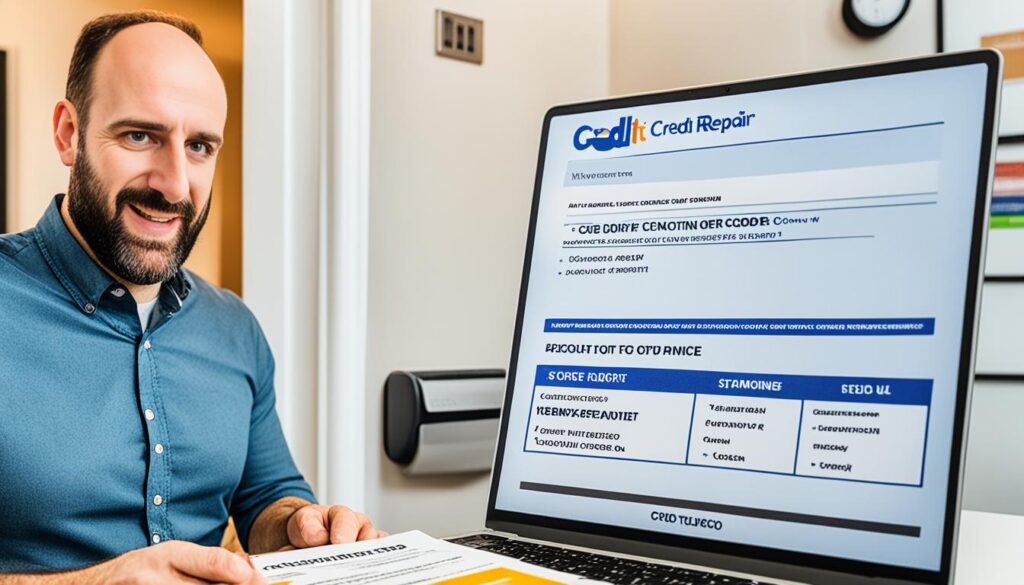Evictions can be stressful, especially when they affect your credit report. But there’s hope! You can dispute an eviction on your credit report in certain cases. Understanding this process is key for improving your rental history and credit standing. does eviction hurt your credit
eviction on credit
Tenant credit repair can be tricky, but it’s doable. Knowing your rights and the steps to take is crucial. This guide will help you navigate disputing evictions on your credit report.
We’ll look at how evictions impact your credit score. We’ll also cover legal grounds for disputes and ways to remove negative rental history. By the end, you’ll be ready to tackle eviction-related credit issues.
Key Takeaways
- Evictions can be disputed on credit reports under specific circumstances
- Understanding the eviction reporting process is crucial for successful disputes
- Legal grounds exist for challenging inaccurate or unfair eviction records
- The Fair Credit Reporting Act provides rights for tenants in credit reporting matters
- Proper documentation is essential when initiating an eviction credit dispute
- Professional credit repair services can assist in addressing eviction-related credit issues
- Preventing future evictions is key to maintaining a positive rental history and credit score
Understanding Evictions and Credit Reports
Evictions can seriously hurt your credit report and financial future. They affect your ability to rent and get loans. Let’s explore evictions and their impact on credit scores.
What is an eviction?
An eviction is when a landlord legally removes a tenant from a rental property. It usually happens when tenants break lease terms or don’t pay rent. Each state has different eviction reporting laws.
How evictions appear on credit reports
Evictions don’t show up directly on credit reports. However, related money issues might appear. These can include unpaid rent in collections and court judgments for owed money.
- Unpaid rent sent to collections
- Court judgments for money owed
- Public records of eviction lawsuits
Sometimes, wrong information about evictions can end up on your credit report. That’s why it’s important to check your report often for mistakes.
Impact of evictions on credit scores
Evictions can greatly lower your credit score. This makes renting and getting loans harder in the future. The exact effect depends on your credit history and eviction details.
| Eviction-Related Item | Potential Credit Score Impact | Duration on Credit Report |
|---|---|---|
| Unpaid Rent in Collections | 50-100 points | 7 years |
| Court Judgment | 100-150 points | 7 years |
| Eviction Lawsuit (Public Record) | 30-50 points | 7 years |
Know your state’s eviction reporting laws. Check your credit report often. This helps you spot and fix issues quickly. It also protects your financial health.
The Process of Eviction Reporting
Eviction reporting starts when tenants break lease terms or don’t pay rent. Landlords file lawsuits, leading to court proceedings. If landlords win, the eviction becomes public record.
Credit bureaus scan court records for evictions regularly. They add this info to credit reports, affecting creditworthiness. Many tenants try to dispute their rental history when facing eviction debt collection.

Eviction reporting timelines can vary. Court filing takes 1-2 weeks. Court decisions take 2-8 weeks. Credit bureaus report in 30-60 days.
- Court filing: 1-2 weeks
- Court decision: 2-8 weeks
- Credit bureau reporting: 30-60 days
Tenants can challenge wrong eviction records through rental history disputes. This involves contacting credit bureaus with proof. Successful disputes can remove eviction entries from credit reports.
| Party | Role in Eviction Reporting |
|---|---|
| Landlord | Files eviction lawsuit |
| Court | Hears case, issues judgment |
| Credit Bureau | Collects court data, updates credit reports |
| Tenant | Can dispute inaccurate records |
Knowing this process helps tenants handle eviction situations better. It’s important to deal with eviction issues quickly. This can reduce long-term money problems.
Can You Dispute an Eviction on Your Credit Report?
You can challenge an eviction on your credit report if it’s wrong or unfair. Let’s look at how to dispute an eviction credit report entry.
Legal Grounds for Disputing an Eviction
Valid reasons for an eviction credit dispute include:
- Incorrect information on the report
- Outdated eviction records
- Illegal eviction practices
- Identity theft or mixed credit files
Steps to Initiate a Dispute
To start an eviction credit dispute, follow these steps:
- Review your credit reports from all three major bureaus
- Identify the eviction entry you want to dispute
- Gather supporting documentation
- File a dispute with the credit bureaus online, by mail, or phone
- Wait for the investigation results (usually 30-45 days)
Required Documentation for Disputing
When disputing an eviction on your credit report, include these documents:
| Document Type | Purpose |
|---|---|
| Proof of identity | Verify you’re the rightful account holder |
| Court documents | Show dismissal or resolution of eviction case |
| Lease agreements | Prove tenancy details and compliance |
| Payment records | Demonstrate on-time rent payments |
| Correspondence with landlord | Support your claim of wrongful eviction |
Disputing an eviction on your credit report takes time and detailed proof. Good records are key to a successful dispute.
If you’re not sure what to do, ask a credit repair expert for help. They can guide you through the process.
Common Reasons for Eviction Disputes
Eviction disputes stem from various situations. Tenants may challenge unlawful eviction records or address credit report errors. Understanding these reasons can help landlords and tenants avoid conflicts.

Nonpayment of rent is a top cause for evictions. Tenants might dispute this if they believe they’ve paid in full. Lease violations, like unauthorized pets or subletting, can also trigger evictions.
Property damage claims often lead to disputes. Tenants may challenge these, especially if they think the damage was pre-existing. Georgia eviction laws provide specific procedures for handling such issues fairly.
“Eviction disputes often stem from miscommunication or misunderstanding of lease terms. Clear, written agreements can prevent many conflicts.”
Some evictions result from false rental application information. Tenants might dispute these if they can prove the information was accurate. Knowing your rights and how to address credit report errors is crucial.
| Dispute Reason | Tenant Perspective | Landlord Perspective |
|---|---|---|
| Nonpayment of Rent | Rent was paid or amount disputed | Rent not received or incomplete |
| Lease Violations | Actions didn’t violate lease terms | Clear breach of agreement |
| Property Damage | Pre-existing or normal wear and tear | Significant damage beyond normal use |
| Application Misinformation | Information was accurate or unintentional | Deliberate falsification of details |
Understanding these dispute reasons can help both parties reach fair solutions. This knowledge can prevent unnecessary conflicts and credit report errors. It also helps in challenging unlawful eviction records effectively.
The Fair Credit Reporting Act and Evictions
The Fair Credit Reporting Act (FCRA) safeguards tenants’ rights during evictions. It sets rules for eviction reporting and affects tenant credit repair. This federal law is crucial for protecting renters.
Your Rights Under the FCRA
Tenants have specific rights regarding eviction records on credit reports. The FCRA lets you dispute inaccurate information and ask for corrections. You can get a free yearly credit report from each major bureau.
Time Limits for Reporting Evictions
Eviction records can stay on your credit report for up to seven years. After this time, credit bureaus must remove the information automatically. This limit is key for credit repair after an eviction.
Credit Bureaus’ Responsibilities
Credit bureaus have duties under the FCRA for eviction reporting:
- Investigate disputes within 30 days
- Provide results of investigations to consumers
- Remove or correct inaccurate information promptly
- Maintain reasonable procedures to ensure accuracy
| FCRA Provision | Impact on Tenants |
|---|---|
| Free Annual Credit Report | Allows monitoring of eviction records |
| Dispute Process | Enables correction of errors |
| 7-Year Reporting Limit | Ensures eventual removal of old evictions |
Knowing these FCRA rules helps tenants manage their credit reports well. It’s key to handling eviction reporting challenges. Understanding these rights is vital for successful tenant credit repair.
Strategies for Removing an Eviction from Your Credit Report
An eviction on your credit report can be tough. But there’s hope! You can use effective strategies to remove eviction from credit report and boost your finances.
Gather all documents related to your eviction. This includes court papers, lease agreements, and landlord communications. These are crucial for starting a rental history dispute.
Talk to your previous landlord. A simple chat might solve the problem. If you’ve paid off debts, ask them to remove the eviction record.
- Review your credit report for errors
- File a dispute with credit bureaus
- Negotiate with the landlord
- Seek legal advice if needed
If talking fails, file a dispute with credit bureaus. Provide clear evidence to support your case. Credit bureaus must investigate disputes within 30 days.
For tough cases, get professional help. Credit repair services can guide you through the process. They’re experts in handling eviction disputes and offer valuable insights.
“Knowledge is power when it comes to credit repair. Understanding your rights and the dispute process can make a significant difference in your outcomes.”
Work on rebuilding your credit. While removing the eviction, improve other parts of your credit report. This approach can lessen the eviction’s impact on your overall creditworthiness.
Challenging Unlawful Eviction Records
Tenants must know their rights when facing eviction. Some landlords may attempt illegal evictions. Challenging unlawful eviction records protects your rights and credit score.
Identifying Illegal Evictions
Illegal evictions come in various forms. These include changing locks without notice or shutting off utilities. Tenants should document all landlord interactions and keep copies of notices.
Legal Resources for Tenants
Many groups offer free or low-cost legal help for eviction cases. Legal aid societies and tenant rights groups can provide valuable assistance. These resources help tenants understand their rights and challenge unfair evictions.
State-Specific Eviction Laws
Eviction reporting laws differ by state. Some states offer stronger tenant protections than others. Research your state’s specific laws when challenging an eviction.
| State | Notice Period | Tenant Protections | Eviction Reporting |
|---|---|---|---|
| California | 3-60 days | Strong | 7 years |
| Texas | 3 days | Limited | No limit |
| New York | 14-30 days | Very Strong | 1 year |
Knowing these laws helps you challenge unlawful eviction records effectively. It also aids in navigating eviction reporting laws in your state.
The Role of Credit Repair in Eviction Disputes

Credit repair services help tenants fix eviction-related issues on their credit reports. These services offer expertise to navigate the complex dispute process. They’re valuable for those facing credit report eviction errors.
Specialists focus on spotting inaccuracies and removing incorrect eviction records. They draft effective dispute letters and gather necessary documentation. These experts also follow up with creditors and reporting agencies.
Professional credit repair services can significantly increase the chances of successfully disputing an eviction on your credit report,” says a leading credit repair expert.
Credit repair services offer benefits, but it’s important to consider both sides. Here’s a quick look at the pros and cons:
| Pros | Cons |
|---|---|
| Expert knowledge of credit laws | Potential costs involved |
| Time-saving for tenants | No guarantee of success |
| Higher success rates in disputes | Risk of scams or unethical practices |
| Ongoing credit monitoring | May take several months for results |
Research reputable companies before choosing tenant credit repair services. Understand their process for fixing credit report eviction errors. Look for firms with success stories and positive client feedback.
Eviction Debt Collection: What You Need to Know
Eviction debt collection can be stressful. Landlords may use agencies to recover unpaid rent or damages. This can hurt your credit score and future rental chances.
Knowing your rights is key when dealing with debt collectors. The Fair Debt Collection Practices Act shields you from unfair tactics. You can dispute any debt you think is wrong.
To guard yourself during eviction debt collection:
- Request debt verification in writing
- Keep detailed records of all communications
- Know the statute of limitations for debt collection in your state
- Consider negotiating a settlement or payment plan
Quick action is vital for rental history disputes. Check your eviction record’s accuracy and fix errors fast. This can ease the impact on future housing options.
Boosting your credit score is crucial to overcome eviction issues. Spot and challenge errors on your credit report. This can help fix your credit and improve rental chances.
“Knowledge is power when dealing with eviction debt collection. Understanding your rights and taking proactive steps can help you navigate this challenging situation and protect your financial future.”
Appealing an Eviction Judgment
Eviction can be scary, but knowing how to appeal can protect your rights. You can challenge an unlawful eviction if you think the court made a mistake.
Grounds for Appeal
Valid reasons for an eviction judgment appeal include:
- Procedural errors during the original hearing
- New evidence that wasn’t available earlier
- Misinterpretation of the law by the judge
- Landlord’s failure to follow proper eviction procedures
The Appeals Process
To initiate an appeal:
- File a notice of appeal within the specified timeframe
- Pay the required filing fees
- Prepare a written brief outlining your arguments
- Attend the appeals hearing
Potential Outcomes
The appeals court may:
- Uphold the original judgment
- Reverse the decision
- Send the case back for a new trial
A successful appeal can remove the eviction from your record. This might boost your credit score and future housing options. The appeal process can be tricky, so getting legal advice is smart.
| Appeal Outcome | Impact on Tenant | Next Steps |
|---|---|---|
| Judgment Upheld | Eviction remains on record | Explore other housing options |
| Judgment Reversed | Eviction removed from record | Possible return to property |
| New Trial Ordered | Temporary relief | Prepare for new hearing |
Preventing Future Evictions and Protecting Your Credit
Paying rent on time is crucial for a good credit score. If you’re struggling, talk to your landlord about payment options. Good communication can prevent misunderstandings that might lead to evictions.
Maintain your rental space well and follow lease terms. Be respectful of neighbors to build a positive rental history. Address disputes quickly and professionally to avoid escalation.
Check your credit report yearly for errors. File a dispute right away if you spot inaccuracies. Quick action can prevent long-term damage to your credit score.
A clean rental record helps protect against future eviction risks. Stay proactive and responsible to safeguard your living situation. These habits create a strong foundation for financial health.

